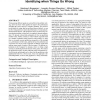Free Online Productivity Tools
i2Speak
i2Symbol
i2OCR
iTex2Img
iWeb2Print
iWeb2Shot
i2Type
iPdf2Split
iPdf2Merge
i2Bopomofo
i2Arabic
i2Style
i2Image
i2PDF
iLatex2Rtf
Sci2ools
ATAL
2015
Springer
2015
Springer
Every Team Deserves a Second Chance: Identifying when Things Go Wrong
Voting among different agents is a powerful tool in problem solving, and it has been widely applied to improve the performance in finding the correct answer to complex problems. We present a novel benefit of voting, that has not been observed before: we can use the voting patterns to assess the performance of a team and predict their final outcome. This prediction can be executed at any moment during problem-solving and it is completely domain independent. We present a theoretical explanation of why our prediction method works. Further, contrary to what would be expected based on a simpler explanation using classical voting models, we argue that we can make accurate predictions irrespective of the strength (i.e., performance) of the teams, and that in fact, the prediction can work better for diverse teams composed of different agents than uniform teams made of copies of the best agent. We perform experiments in the Computer Go domain, where we obtain a high accuracy in predicting t...
| Added | 16 Apr 2016 |
| Updated | 16 Apr 2016 |
| Type | Journal |
| Year | 2015 |
| Where | ATAL |
| Authors | Vaishnavh Nagarajan, Leandro Soriano Marcolino, Milind Tambe |
Comments (0)

